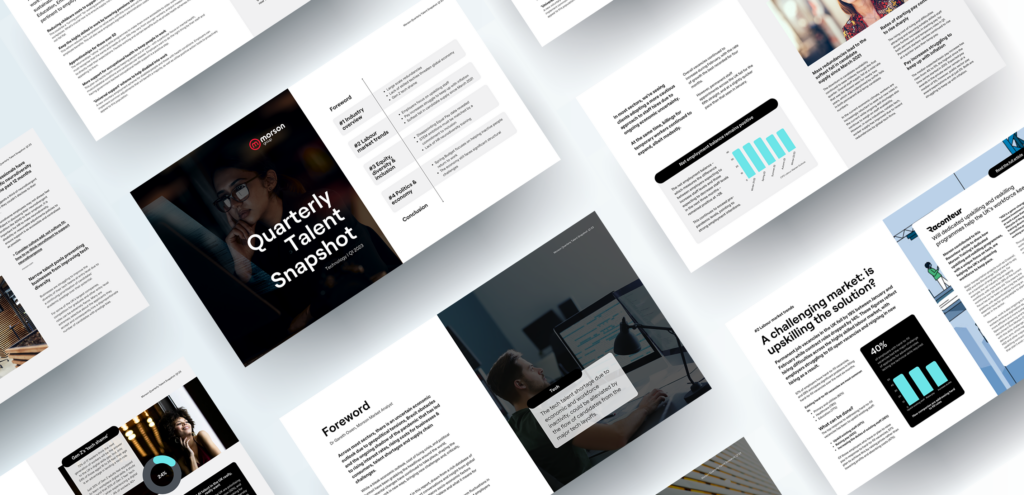With the engineering skills crisis worsening year on year, Morson Group has once again shown a proactive approach to tackling the problem by inspiring a new generation of engineers to become leaders in their field with their annual Early Careers Development Programme...
READ MORE…
Morson Group reports strong financial performance for year end 2023
Morson Group has recorded another record year as Group revenue jumped from£1,151.7m in 2022 to £1,332.9m in 2023, underscoring Morson’s ability to scaleits operations efficiently while maintaining high levels of service and client satisfaction. The Group also reported...
The Morson STEM Foundation Impact Report 2024
Our purpose is to positively impact lives every day, and every member of the Morson Group is driven to fuel innovation, empower industry and enable opportunities for people. The UK's ongoing STEM skills shortage has been estimated to cost the UK economy £1.5billion...
Morson Market Analyst, Dr Gareth Owen offers his insight on the labour market trends which have defined this year across key industries; aerospace, rail, construction, tech and utilities. Within each report, he provides an accurate picture of what’s happening in each industry right now and into the future. We’ve seen optimism across most sectors in the first half of 2023, with big investment plans and strong revenue growth. But uncertainty lies ahead, as the UK economy is experiencing a turbulent ride, with a recession still likely in 2023.
Skills shortages and supply chain issues still represent the biggest obstacles to growth that breaks through pre-pandemic levels.
The labour market trends outlined in each report signify opportunities and challenges which will require a relentless focus on talent attraction and retention, concentrating on widening the talent pool through attention to welcoming diversity.

Aerospace & defence experience growth in spite of skills gaps
The UK aerospace and defence sector continues to thrive, on its journey to reaching pre-pandemic performance in 2024.
The UK aerospace sector had a 300% YoY increase in orders and a 40% increase in deliveries in May 2023.
Labour and supply chain shortages have slightly spoilt the party, causing airlines to express frustration with delays to plane deliveries. A full supply chain recovery is not expected until 2026.
The skills gap is becoming increasingly tight as international demand for workers increases on back of the war in Ukraine and rapid growth in artificial intelligence and machine learning activity. Cobham and Ultra boss, Shonnel Malani, has suggested that the rise in home working is an obstacle in the war for talent with foreign rivals.
Lack of certainty amid delays to HS2
Network Rail released its £44bn, five-year plan for England and Wales, an increase of £1.8bn on CP62. The plan shows increased investment in tackling climate change, improving train performance, and investing in things that matter to passengers and freight users.
This lack of certainty around the creation of Great British Railways, which will take on a wide-ranging management role for “track and train”. Which has caused some reduction in confidence and investment by the rail supply chain, as reported by Petards.
Though the increase in rail spending is welcome, the opportunity is balanced by significant challenges. Including managing infrastructure, which in some cases is nearly two centuries old, especially when combined with the impacts of a changing climate, and significant inflation risk.
The UK government’s decision to delay aspects of HS2 is unlikely to save costs in the long term. It feels like a short-term fix taken by a government more focused on the general election in 2024.
Inflation is an obstacle to growth for construction & infrastructure
A wide range of companies in the infrastructure sector have reported strong growth in 2023, particularly in revenue. However, this is tinged with inflationary pressures in the wider economy causing profits to drop.
The stabilisation of energy prices and supply chain issues in the construction sector have helped improve performance. However, there is still uncertainty ahead, as the UK economy is sailing close to a recession.
Another barrier to growth is the increasing importance of skills shortages in the construction industry. Currie and Brown reporting that skills are the primary threat to major infrastructure projects, with a predicted 8.3% increase in labour costs during 2023.
Infrastructure is missing out on a largely untapped source of talent as only 15% of the construction workforce is female. So it is good to see Katy Dowding taking the helm at Skanska UK, the only woman to run a tier one contractor.
Lay-offs in social vs growth in cybersecurity
The technology sector continues to face large-scale redundancies. Particularly in social media companies, with fresh job cuts announced in Q2 by LinkedIn, Meta, Reddit, Spotify and Palantir.
The downturn has also been trending in the recruitment sector. Companies with a focus on tech recruitment, like Robert Walters, have suffered a big drop in income and a 3% reduction in headcount.
In other areas of tech, like Cybersecurity and AI there are stronger opportunities for growth. Evidenced by Dyson, OpenAI, ARM, although this isn’t regionally balanced as eight of the top ten areas for tech are in London.
Q2 also brings a reminder to sharpen up your talent strategy to tackle the challenges of a talent market that still remains competitive, and that exploring a more diverse talent pool can help companies to succeed.
Increasing growth and mounting pressure in Utilities
Q2 has seen a continuation of the intense pressure on water companies, government and the regulator, Ofwat, to address issues of financial sustainability and under-investment in infrastructure.
UK water network suppliers have begun to set out their plans for the PR24 period (2025-2030). These include increased investment, but this will not calm the pressure, given the size of the challenge.
There have been a number of large projects announced across all aspects of power and utilities, with many companies increasing revenue and increasing investment.
Though this is good news, there is still much to do and a core focus on attracting and retaining talent.
Labour market trends: Concluding thoughts
Dr Gareth Owen, Morson Market Analyst
Though the UK has much to be positive about in the first half of 2023, but storm clouds are still on the horizon.
The UK continues to experience high inflation, but the medicine of higher interest rates could easily stall the economy and act as a drag on the journey out of the pandemic era.
Government appears to have lost focus on the key challenges the UK faces in growing the economy. It appears more concerned with short-term measures to make quick impacts, before the next general election.
The labour market remains tight, with broad skills shortages trending, despite the supply of candidates across the labour market rising for four consecutive months. Continued inflationary pressures mean that people will redouble their job search efforts and companies will adapt their operations to battle against the challenges ahead.
Whatever future labour market trends may hold Morson is here to support you to attract, retain and develop the best talent.
Our solutions are for organisations seeking to enhance their capability, who need flexible, adaptable solutions to help scale, brand-led strategies to inspire, screening solutions to comply, ED&I insight to transform, training to develop or technology to streamline and accelerate.
